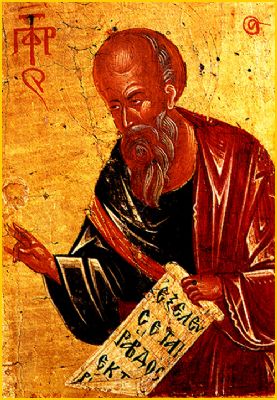|
|||
|---|---|---|---|
| This weekly bulletin insert complements the curriculum published by the Department of Christian Education of the Orthodox Church in America. This and many other Christian Education resources are available at http://dce.oca.org. | |||

The Old Testament prophet Elisha, written about in II Kings 4 (IV Kingdoms in the Orthodox Study Bible), ministered to many people - some generous and unselfish, others greedy and grasping. Their stories are sometimes strikingly similar to those of people we encounter in the New Testament. A wealthy woman invites Elisha for a meal as he passes through Shunem, her home. After that he stops in whenever he is passing through, so she and her husband create a comfortable rooftop chamber for him. She perceives that the prophet is a holy man, like the Samaritan woman in John's Gospel who perceived that Jesus was a prophet. During one visit Elisha asks her what he can do for her in return—perhaps speak to the king on her behalf. Her reply shows that she is not only generous in hospitality, but also is not greedy. Surely she could think of a favor to ask of the king, but she says, "I live among my own people." She is content with what her family and community can provide. She is like the centurion in Matthew 8:7, who declines Jesus' offer to come to his home to heal a beloved servant, asking only that the Lord use His power over illness to restore the man's health. For the Shunamite woman and the centurion, the meeting of a need is enough. They will not ask for more, even though they could. Another time, Elisha heals Naaman, a Syrian army commander, of leprosy. A captive girl from Israel who serves Naaman's wife expresses the generous wish that the leprous commander could meet Elisha, "the prophet of God in Samaria." She tells her mistress that this would insure Naaman's cure. Eventually Naaman does meet the prophet. At first he is indignant that Elisha wants him to bathe in the Jordan, so inferior to Damascus' rivers! Finally, at the gentle urging of his own servant, he obeys Elisha and is healed. Now a grateful believer in the one true God, Naaman offers Elisha a gift, which the prophet refuses. He is like the "unmercenary healers" among the saints who took no pay or presents. But one person is only too glad to try to "get something" from Naaman. Gehazi, Elisha's servant, follows the commander and requests money, which Naaman freely gives. Gehazi hides the money, forgetting that Elisha has spiritual sight and will know what he has done. He lies to the prophet, and for his evil deeds is afflicted with leprosy.
The story is as chilling as the description in Acts of Ananias and Sapphira, who hold back some of their property from the company of believers and then lie about it to the apostle Peter. Their greed and their lie cause them to be struck dead. Elisha dealt with people at their best and at their worst, just as other prophets and the apostles did. He is honored by the Church because whatever situation or person he might be dealing with, he was the "man of God" doing His will. |
|||
